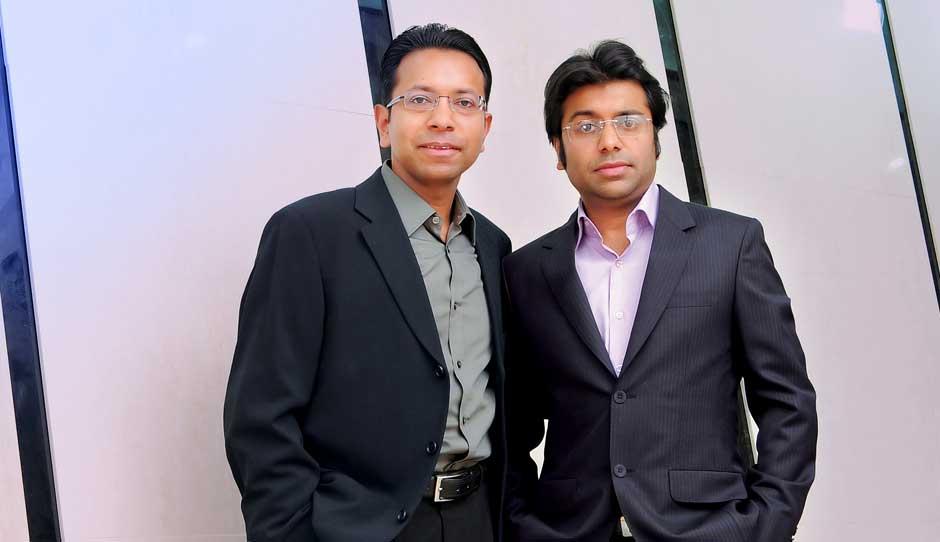Can the Kajaria Brothers Cement Their Growth Plans?
- BY Ira Swasti
 In
In  13486
13486 0
0

The brothers believe their fresh ideas, and their father’s experience is just the shine Kajaria Ceramics, their Rs1,000-crore company, needs.
As long as we manage to take the company forward, I don’t care about being a second-generation entrepreneur." - Rishi Kajaria
Chetan Kajaria (CK): I was always certain I wanted to join the family business. After completing my engineering in 1996, I did a one year stint with the company in the exports department and learnt the basics. Then I went to the US for my MBA and came back in 1999 to head the ceramic tiles division of our family business.
Rishi Kajaria (RK): Instead of putting my effort into starting something else, I thought I might as well come back to the family business and make it grow. I joined Kajaria in 2000 after finishing my degree from the University of Boston. I trained for a couple of years in the company. In 2003, I started a new division for vitrified tiles, separate from ceramic tiles that Chetan was heading.
CK: Because we head two separate divisions in the company, our roles are well defined. There aren’t any differences between us. For common areas such as human resources, finance and accountancy, our father, Rishi and I have fortnightly meetings where we discuss what is going on in our respective areas and set goals for the future.
RK: A lot of issues concerning both the verticals come up on a daily basis but we sort them out in meetings and once we leave the room, we speak the same language. It’s never you are right or I am right. Both of us would put our point forward and then let logic reach a definite conclusion.
CK: There’s no question of seniority between us either. My being four years elder to him does not matter because we joined the company roughly around the same time. Experience-wise, we’re almost at par.
RK: I think when the younger generation joins the company; a lot of new ideas come in. Fortunately, our father has always been receptive. There was no defined HR head when we came in. After putting in place an HR team, we’ve introduced ESOPs, and also better tools to judge performance.
CK: Till recently, we were known only as manufacturers of tiles. About a year and a half back, we tied up with Vitra, the fifth-largest company in the world for sanitary ware and fittings. We’ve also become more aggressive.
People may think things have been easy for us. But we had to prove ourselves when we joined the company.
RK: As the younger generation, aggression is our key strength. But the experience of having spent decades in the industry can only come from our father. That is invaluable. For example, when I began the new division of vitrified tiles, all the systems that were already running in the other division were replicated. I had the benefit of experience. I find it surprising when I hear people say they can’t work with their fathers. Why can’t they? It’s possible to have an open dialogue with your father, learn from him without having to argue with him all the time.
CK: Our father doesn’t impose things on us. Every issue is robustly debated. He’s very modern and there is no generation gap between us. He’s also good at giving us credit. When he sees our recent numbers, he is very proud. In the mid 2000s, we were a Rs150-crore company. Today, we do an annual business of around Rs1,000-crore.
RK: Joining a family business doesn’t mean you just rest on past success. People may think things have been easy for us. But we had to prove ourselves when we joined the company. It’s only when employees and clients see you working long hours that they realise you are as serious about the business as your father was. Plus, we’re in a very competitive industry. You have to keep innovating to make sure you’re ahead of the competition. As long as we manage to take the company forward, I don’t care about being a second-generation entrepreneur.
CK: Each generation faces its own challenges. Both have it equally tough. In the ceramics industry, the technology used by every player is the same. What differentiates you is how you market your product, and how strong your dealer network is. While dad has done a tremendous job of building a strong network of over 6,000 dealers, we have the equally tough task of maintaining and strengthening it. Also, we have to build the brand. That didn’t need to be such a focus earlier.
Company Profile|Kajaria Ceramics
Kajaria Ceramics was founded by Ashok Kajaria in 1988 with a production capacity of one million sq mt of tiles. Since then, it has laid out a richly-patterned business journey. Today, it is one of the largest wall and floor tiles manufacturers in India with a production capacity of 30.60 million sq mt, and more than 400 options of ceramic, vitrified and glazed vitrified tiles. In 2011, the company clocked a turnover of Rs1,000 crore, and has laid out a growth plan to double that within the next three years.





























Add new comment